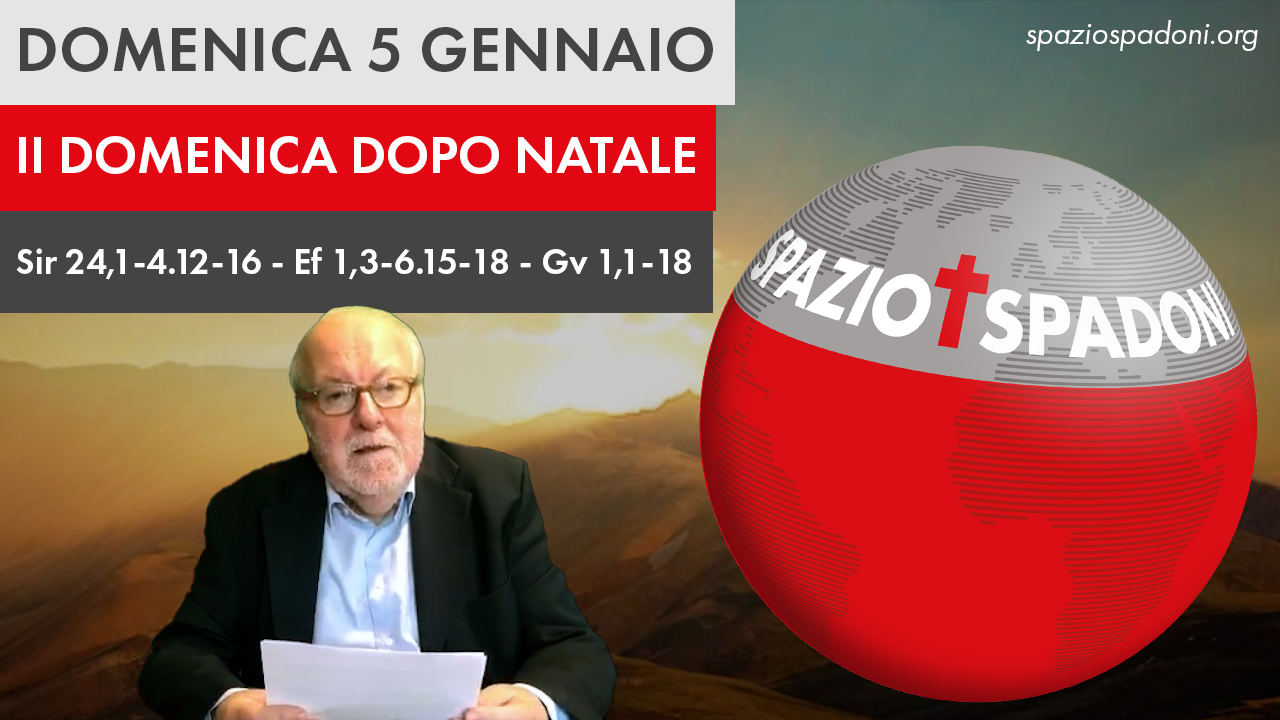
II Sunday After Christmas
Readings: Sir 24:1-4.12-16; Eph 1:3-6.15-18; Jn 1:1-18
The Prologue of John’s Gospel, which the Liturgy offers us today, is such a high song that, as Augustine and Chrysostom note, only divine revelation could express it. And for John, precisely, the symbol of the eagle was chosen. The Western Church used it as a blessing for the sick, the newly baptized, and at the end of Mass.
There has been much debate whether it had any relationship to the Gospel, whether it was a prelude to it, an outline, a summary, or simply a formulation of the kèrigma, the proclamation, in Hellenistic terms to win over Greek readers.
In any case, the Prologue announces John’s three-dimensional theology: the revelation of God in Jesus Christ-our call to Faith-Jesus Christ-salvation for all creation.
In particular
- The revealing Word of God
The word of God (Dabar IHWH) is seen as a person in Is 55:10-11 and Wis 18:15-16.
It is creative power in Sl 33:6-9 and in Sl 147:15.18-19, in Wis 9:1 and Sir 42:15.
It is identified with Torah (Law) in Sl 119; 78:10; Is 1:10; 2:3…
It is identified with Wisdom (Kokmah), as in today’s first reading from the book of Sirach (Sir 24:1-4.12-16).
Such Wisdom:
a) is with God before creation (Wis 9:4,9; Prov 8:22-23,30; Sir 24:3f…);
b) is mediator of creation (Wis 9:1-2,9; 7:21,26; Prov 3:19-20; 8:26-30):
c) she came to earth (Prov 8:31; Wis 7:22,27; 9:10; Sir 24:8-11; Enoch 42:2);
d) she is the bearer of benefits to men (Sir 24:20; Prov 8:35; 9; 5…).
These concepts are even more evident in the Targum, the Aramaic translation of the Hebrew Bible: the Memrà (= “Word” in Aramaic) has a creative, but above all a revelatory function. And it is God’s Memrà that reveals and saves (cf. Targum Jerushalaim on Deut. 32:39 and Targum Neophytes on Lev. 22:23). - The revelatory incarnation
John’s “scandal” is that the Word of God, Torah, Wisdom (already identifiable with each other in the Old Testament) has become a historical man, Jesus of Nazareth: the Shekinàh has pitched its tent in the visible body of Jesus.
God has become history: he who sees Jesus sees the Father (12:45; 14:9)! It is the most shocking message in history, challenging us to answer. Who is Jesus to me? Do I accept him? Do I believe in him? Is he the friend who dialogues with me?
Is he my way, truth, life? Do I love Jesus? Do I seek him? Is he my everything, my only thought, the purpose of my life? Do I know that only he “who is in the bosom of the Father” (v. 18) can reveal the Father to me?
We needed John! The God we sought so much in the Old Testament has now been revealed in a man, walking with us, his Son Jesus Christ! Theology becomes Christology! Astonished we worship this man, this brother of ours, whom we have discovered to be the Shekinah of God in our midst. In him God dwells with us, we become “his things” (v. 11), God’s family, even his children (v. 12).
All that remains is for us to receive him, believing of his name (v. 12). - Salvation
The Incarnation completes the creation plan, as the Second Reading (Eph 1:3-6,15-18) states, “God chose us before the creation of the world…, predestining us to be his adopted sons through Jesus Christ” (Eph 1:4-5). God, Love, wanting to have a partner in Love, creates man and the cosmos, but he must create them other than himself. And if God is infinite man will be finite, if God is eternal man will be mortal, if God is immense man will be limited.
But God wants man immortal, limitless, divine. And therefore from the first creative act there is provision for the Incarnation, whereby it is God Himself takes upon Himself the limitation of man, and annihilates him in the Resurrection. The Word goes out from the Father, enters creation, and returns to the Father, but bringing with him man, finally “deified,” “son of God,” and with man the whole creation freed from evil. Genesis 1-2 is actually the Apocalypse, it is prophecy of the free, immortal man who chats with God in the evening breeze, the man who is fulfilled only after the Incarnation of the Son, the true Adam, “the Man” par excellence (Jn. 19:5), the Archetype of all creation: “everything was made through him, and without him nothing was made of all that exists” (Jn. 1:3).
